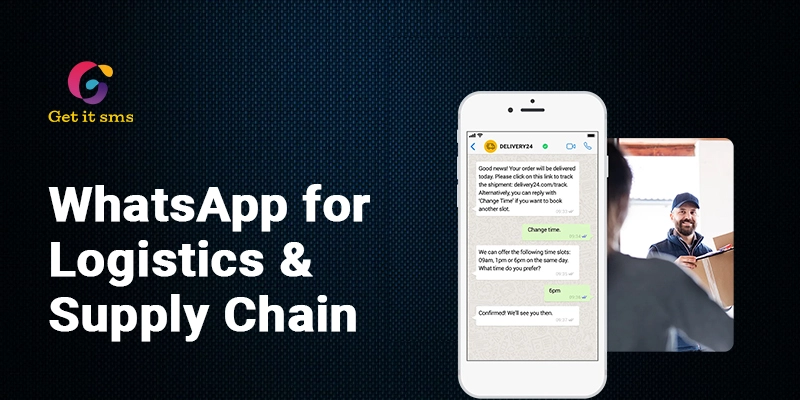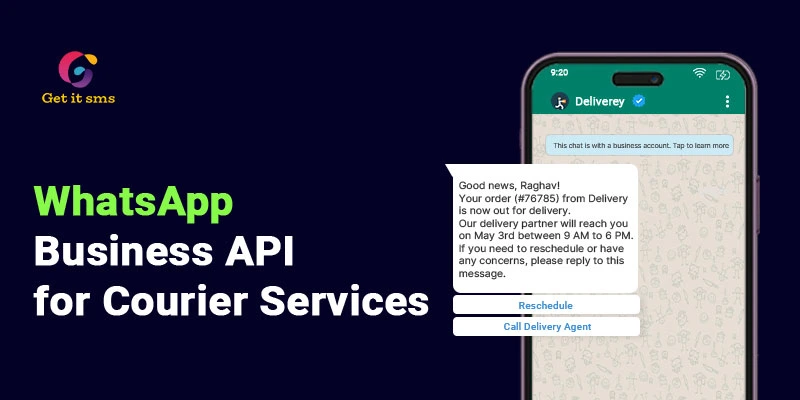Want To Send Bulk SMS?
If yes, then test our service for FREE.
Get a 1 Month Free Trial of WhatsApp Business API
This time, we will use WhatsApp Business API for logistics and supply chain, in which logistics partners will achieve the best way to deliver packages. Every logistics task is a chain based on an effective conversation at the right time to produce delivery attempts properly.
WhatsApp contains more than 2 billion active users, and each user likes to spend more than 12 hours on WhatsApp per day. The application usability is very simple, and the most effective solution for companies around various companies, and logistics & supply chain is one of them.
Inheriting such a channel with WhatsApp business API empowers marketing strategy levels. It reduces team costs due to its numerous services, such as WhatsApp marketing campaigns, automation API, and auto-reply chatbots for customer service, etc.
This article describes how industries are looking for a smart tech strategy for their tasks and customer satisfaction. WhatsApp’s business API meets every logistics requirement.
What is WhatsApp Business API for Logistics & Supply Chain?
Whatsapp business API for logistics and supply chain utilizes the WhatsApp channel for managing operations to simplify two-way conversations and foster client communication and satisfaction. Logistics industries can implement WhatsApp API into their business software to use amazing features like automation, address inquiries, share locations, delivery status, real-time updates, and verifications.
WhatsApp facilitates two-way communication through the end user’s preferred messaging app, allowing the logistic team to communicate directly with customers and provide a convenient experience. Additionally, WhatsApp enables the logistics company to send files, brochures, and other materials in visually appealing multimedia messages.
Customers receive logistics-related WhatsApp messages with a green checkmark next to their profile photo. It adds value to the brand and creates a perception of reliability. By following the instructions, you can apply for the green tick verification with ease. We have covered the benefits and use cases of the WhatsApp API for Logistics. Let’s examine its use in the logistics sector.
6 Key Benefits of WhatsApp Business Section in Logistics
Whatsapp business API allows the logistics industry to automate delivery updates for every step of the shipping process. These updates involve notifications when items are stored, packed, received, picked, and dispatched. Such timely updates enhance transparency for all stakeholders and confirm that everyone is updated on the status every time.
Here are the benefits of Whatsapp business API for logistics and supply chain management:
1. Boost customer support
Customer support in every business is the most important factor that should be fulfilled. The WhatsApp Business API ensures the best customer service by providing effective features. As per the report, 83% of consumers said customer service is an important factor in increasing brand loyalty. In the logistics sector, customer problems basically revolve around their shipment status.
2. Two-way communication ability
Yes, WhatsApp’s business API offers two-way communication, and many customers have become comfortable with this channel. WhatsApp generally invites dialogue between customers and companies, which means you can leverage the platform to have real conversations with clients.
3. Global Engagement
Whatsapp connects people worldwide, and large industries use API to communicate with their customers. WhatsApp Business API is the right option for updating your customers globally.
4. Offers end-to-end encryption
Whatsapp business API for logistics regarding customer order updates and contact details are communicated. Hence, it offers an end-to-end encryption technique to ensure the message is read by the receiver only. End-to-end encryption means only the sender and receiver would be able to read and send messages; this provides the safety of important data and creates customer trust.
5. Excellent customer relationship management
Better customer interactions: Building enduring, meaningful relationships with customers may be challenging, particularly for businesses. WhatsApp enables companies to interact with customers in real-time and on their terms, offering individualized service. This allows the creation of trusted, one-on-one connections.
6. Privacy
Thanks to end-to-end encryption and the business account verification process, WhatsApp users can only receive communications from reputable and secure sources. WhatsApp also ensures the data protection of clients who track their orders through WhatsApp links.
Limitations of WhatsApp API for Logistics
Integrating WhatsApp Business API in logistics helps to simplify conversations with consumers; this provides real-time location tracking, removing the requirement for third-party applications. However, there are some challenges to integrating WhatsApp API. Privacy concerns may occur because of accessing personal customer data. Even WhatsApp has strict instructions for WhatsApp message templates that may limit effectiveness.
To ensure optimal implementation, industries should track customers’ frequent problems and create message templates that comply with WhatsApp’s terms of service. Basically, firms should tell their customers about the benefits of WhatsApp-linked communication and ask permission before sending messages via email or SMS. This helps to achieve an opt-in base and manage the customer relationship.
Strategies Used for WhatsApp Business API for Logistics
There are key strategies that can be used to maximize the effectiveness of WhatsApp API in your logistics and supply chain.
1. Targeting and segmentation
Divide your clients and suppliers into groups based on factors such as product category, location, and purchase history. This assures related details will be sent to the right clients. For example, you can build separate groups for domestic and international suppliers or low-volume and high-potential clients. Targeted customer communication can boost efficiency and reduce the overload of details for both customers and suppliers.
2. Content management strategy
Develop a content strategy for the WhatsApp conversation, which involves developing a clear and concise message. Implement visuals like images and infographics to improve understanding and set a consistent tone or volume for your brand. A well-defined content technique assures clear conversation and lowers the risk of misunderstanding within your logistics work.
3. Notifications and upgrades
Integrating WhatsApp business API for the supply chain provides the capability to share notifications, alerts, and reminders at the various levels of the supply chain. This allows you to ensure that all related suppliers are on the same page and keep your inventory monitoring on point. You can upgrade the stores that are out of stock or send reminders to suppliers to restock sold-out products.
4. Implementation of WhatsApp Business API
Whatsapp business API for logistics and supply chain permits the expansion of WhatsApp’s ability to manage online supply chain software by linking it with third-party software. This allows access to the whole set of assets and services, which helps completely modify and optimize the ecosystem to build the best experience for every supplier included. WhatsApp’s business API also provides companies with multiple features that increase these processes, such as automation, customization, and bulk messages.
5. Implement WhatsApp chatbot and automation
Implementing WhatsApp chatbot and WhatsApp automation into your logistics and supply chain business reduces operational costs and offers self-service abilities with 24*7 low-maintenance customer services between other operations.
Use Cases of WhatsApp Business API for Logistics & Supply Chain
We will tell you how logistics and supply chains can leverage WhatsApp business API here. See the best practices of the companies that can leverage WhatsApp for online supply chain management:
1. Share delivery details precisely
Logistics companies can leverage WhatsApp’s business API to share delivery updates. They can update customers by sending real-time updates, including order status, estimated delivery times, and tracking numbers. Customers can even get direct access to speak with agents through WhatsApp chat, which allows for seamless conversation.
2. Customer problem solving
Any organization, regardless of industry, must prioritize resolving customer complaints. Understanding and responding to client inquiries presents problems for businesses. WhatsApp Business benefits logistics companies by providing a clear and customized customer support platform through approved BSP and ISP providers like Authkey. WhatsApp users may easily handle questions about products, delivery-related concerns, and order status by using chatbots or live representatives. Customers will trust you more as a result, which improves customer happiness in addition to saving time.
3. Live order tracking
Updating the customer on their live order tracking has been a challenge now. But WhatsApp has an amazing solution for logistics and supply chain management that effortlessly sends real-time delivery updates. This functionality improves transparency, enhances the customer experience, and lowers the need for extra delivery queries.
4. Order confirmation
WhatsApp business seamlessly integrates APIs into the system to verify orders immediately, thus giving clients real-time assurance of their purchases. Whatsapp automation can develop customer confidence by assuring they receive accurate product details as soon as after ordering, helping to increase brand awareness.
5. Advertising campaign
For logistics firms, marketing initiatives are a crucial component of return on investment. WhatsApp can send individualized promotional messages, in contrast to SMS and text campaigns that are unable to do so. WhatsApp’s ability to allow emoticons, GIFs, photos, and videos enables logistics firms to build interesting campaigns, draw in more customers, and boost sales.
6. Internal inventory control.
Logistics firms need help with internal inventory management because they are frequently perplexed by standard mobile messaging. However, logistic inventory management is made simple using the WhatsApp Business API. Workers may monitor inventory levels, reorder inventory, and improve overall operational efficiency by having access to real-time inventory updates.
7. Send alert and notification
Logistics businesses can sometimes experience delays and problems while sending messages, leading to a lack of timely information. However, the concern is lower when using WhatsApp’s business API. As long as clients have internet access, every marketing piece can be sent immediately without any delay. This dynamic conversation not only lowers the customer’s dissatisfaction but also improves the entire customer experience.
8. Delivery assurance and confirmation
Whatsapp business API for logistics and supply chain needs helps ensure successful delivery. Clients can also express concerns about the need for more products when delivery refers to successful completion. To control such scenarios, companies integrate WhatsApp API into their system and provide features like delivery confirmations, images of packages, and digital signatures to provide proof of delivery.
Frequently Asked Questions
Q1. What is WhatsApp Business API for logistics & supply chain?
A. Whatsapp business API for logistics and supply chain utilizes the WhatsApp channel for managing operations to simplify two-way conversations and foster client communication and satisfaction.
Q2. Can customers track their orders via WhatsApp API?
A. Yes, by integrating WhatsApp into the logistics system, customers can track their orders on their WhatsApp. Also, they will receive real-time notifications & updates on their orders.
Q3. How can the suppliers use API for real-time shipment tracking?
A. Logistics industries can implement WhatsApp API into their business software to use amazing features like automation, address inquiries, share locations, delivery status, real-time updates, and verifications.
Q4. Is the Whatsapp business API secure enough to send shipping details?
A. Yes, it offers end-to-end encryption, which means only the sender and receiver would be able to read and send messages; this ensures the safety of important data and creates customer trust.
Q5. What is the benefit of using WhatsApp API for logistics?
A. Whatsapp business API allows the logistics industry to automate delivery updates for every step of the shipping process. These updates involve notifications when items are stored, packed, received, picked, and dispatched.
Q6. Can an API be used for the communication between the logistics manager and shipping partner?
A. Whatsapp business API can be used in real-time to communicate between the logistics manager and shipping partner. Every party involved in the shipping process can coordinate easily and efficiently.
Conclusion
In conclusion, the WhatsApp Business API for logistics and supply chain organizations offers many opportunities to improve their warehouse operations. Logistics companies can achieve unprecedented levels of efficiency and customer satisfaction by implementing chatbots, leveraging real-time updates, streamlining internal communication, improving security, and providing actionable insights through performance metrics.
This digital revolution fosters operational efficiency and dramatically boosts a business’s revenue. Getgabs is an expert in WhatsApp business API service, and you can communicate with the Getgabs team to integrate WhatsApp business API into your logistic system. Get in touch with our experts right now to receive proactive help configuring your WhatsApp business API for your logistics company.






 within 24
Hrs +
60
Days Free API Panel
within 24
Hrs +
60
Days Free API Panel





